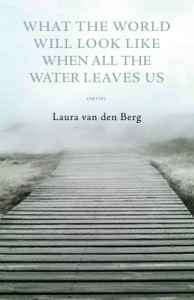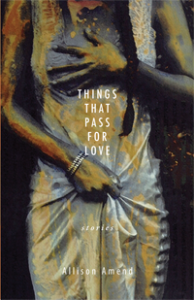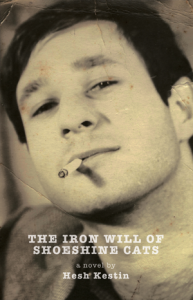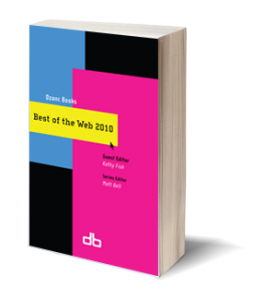As FWR readers know, we’re big fans of the work that Dzanc Books does for the literary world. Not just in terms of publishing, but also education. In addition to the Dzanc Writer In Residence Program, which helps put writers into Michigan schools, and the Dzanc Prize, which gives money to writers to conduct writing workshops in places like VA hospitals, prisons, and in refugee communities, they also offer online tutoring and manuscript consultation through the Dzanc Creative Writing Sessions. All of these are necessary and enriching programs, and we are grateful to have had the opportunity to partner with Dzanc recently in our joint celebration of May as Short Story Month.
 To support the good work that this non-profit does, you can donate to the organization, of course. But another way that you can get behind Dzanc Books is by, well, buying their books. And this is the time to do it! From now until Friday, July 9th Dzanc is offering half-off their books, as well as free shipping.
To support the good work that this non-profit does, you can donate to the organization, of course. But another way that you can get behind Dzanc Books is by, well, buying their books. And this is the time to do it! From now until Friday, July 9th Dzanc is offering half-off their books, as well as free shipping.
Here are some highlights from our reviews of selected Dzanc titles, as well as excerpts from interviews with several Dzanc authors that we’ve published:
- From her review of Laura van den Berg’s collection What the World will Look Like When All the Water Leaves Us, contributor Liana Imam writes:
 “Laura van den Berg’s collection was one of only two books last year that made me cry (the other being Lorrie Moore’s new novel).The stories here are chasing the tails of the same legends as their characters: Bigfoot, the Loch Ness Monster, contentment. And these stories were saddest because these characters always almost had what they wanted; but for whatever reason, they just couldn’t reach out for it.”
“Laura van den Berg’s collection was one of only two books last year that made me cry (the other being Lorrie Moore’s new novel).The stories here are chasing the tails of the same legends as their characters: Bigfoot, the Loch Ness Monster, contentment. And these stories were saddest because these characters always almost had what they wanted; but for whatever reason, they just couldn’t reach out for it.”
- In response to a question from contributor Michael Hinken about why he is drawn to short short fiction, Michael Czyzniejewski, author of Elephants in Our Bedroom, says the following in his interview:
 “I admire the craftsmanship, the sort of concentration and paring-down that goes into writing a short short. To me, it’s a fusion of poetry and fiction, and so you can do things in a short short that you can’t really accomplish in a traditional-length story. The story arc is more simple, and you can pay attention to language and detail in a more focused way. If the story were longer, say twenty pages as opposed to two, nobody could maintain that focus on detail and language for that duration without going crazy. Imagine a punk rock song being seven and a half minutes instead of two minutes.”
“I admire the craftsmanship, the sort of concentration and paring-down that goes into writing a short short. To me, it’s a fusion of poetry and fiction, and so you can do things in a short short that you can’t really accomplish in a traditional-length story. The story arc is more simple, and you can pay attention to language and detail in a more focused way. If the story were longer, say twenty pages as opposed to two, nobody could maintain that focus on detail and language for that duration without going crazy. Imagine a punk rock song being seven and a half minutes instead of two minutes.”
- In her conversation with Allison Amend, author of the collection Things That Pass for Love, Contributing Editor Celeste Ng asks if Amend knows where her stories are headed when she sits down to write. Here is her reply:
 “My stories hook or take odd bounces. I’m not a prolific writer. I think I write the story in my head before I sit down at the computer. That said, my first drafts are very messy. Please don’t publish anything of mine posthumously without serious revision. My similes are appallingly bad. Usually I start the story in the wrong place, include too many scenes, and need to cut the last paragraph, which overexplains.”
“My stories hook or take odd bounces. I’m not a prolific writer. I think I write the story in my head before I sit down at the computer. That said, my first drafts are very messy. Please don’t publish anything of mine posthumously without serious revision. My similes are appallingly bad. Usually I start the story in the wrong place, include too many scenes, and need to cut the last paragraph, which overexplains.”
- Contributor Brian Short concludes his review of Yannick Murphy’s collection In a Bear’s Eye with the following:
 “Yannick Murphy is a re-creation of the Wright brothers’ Kitty Hawk plane. Picture a simple design: a winged frame, a motor, a crude seat, a finned tail. It was not built with trans-continental flights or structural aesthetics in mind. Its purpose becomes clear once you are in the air, with the wind pushing against your face, the dunes and scrub far beneath you, an ocean of froth-tipped waves in the distance. Suspended high above the ground, you find yourself shocked at how few pieces of machinery conspire to hold you aloft, at how much you suddenly regret having to descend through the air and—finally, eventually—return to earth.”
“Yannick Murphy is a re-creation of the Wright brothers’ Kitty Hawk plane. Picture a simple design: a winged frame, a motor, a crude seat, a finned tail. It was not built with trans-continental flights or structural aesthetics in mind. Its purpose becomes clear once you are in the air, with the wind pushing against your face, the dunes and scrub far beneath you, an ocean of froth-tipped waves in the distance. Suspended high above the ground, you find yourself shocked at how few pieces of machinery conspire to hold you aloft, at how much you suddenly regret having to descend through the air and—finally, eventually—return to earth.”
- And here is the opening of contributor Michael Rudin’s forthcoming review of Hesh Kestin’s novel The Iron Will of Shoeshine Cats:
 “Prior to writing his novel The Iron Will of Shoeshine Cats, Hesh Kestin mastered all things non-fiction, serving as European bureau chief of Forbes and war reporter for Newsday before founding two newspapers himself—the Israeli daily The Nation, as well as the prize-winning expatriate, The American. A career crafting leads and managing word counts has shaped Kestin’s fiction in a distinct way: though written richly, it never wastes a cent.”
“Prior to writing his novel The Iron Will of Shoeshine Cats, Hesh Kestin mastered all things non-fiction, serving as European bureau chief of Forbes and war reporter for Newsday before founding two newspapers himself—the Israeli daily The Nation, as well as the prize-winning expatriate, The American. A career crafting leads and managing word counts has shaped Kestin’s fiction in a distinct way: though written richly, it never wastes a cent.”
 We hope you’ll support Dzanc Books and the good work they do. Hell, it might be your work they’re publishing one day. If not between covers, then perhaps in their annual Best of the Web anthology. The 2010 volume just released last week, and we’re thrilled that Christine Hartzler’s essay “Video Games Are Not About Monsters,” which FWR published last year, was selected for the current anthology. If that’s not incentive enough, think of this: where else can you get two books for less than twenty bucks and still have enough left over for a latte? That’s a good deal.
We hope you’ll support Dzanc Books and the good work they do. Hell, it might be your work they’re publishing one day. If not between covers, then perhaps in their annual Best of the Web anthology. The 2010 volume just released last week, and we’re thrilled that Christine Hartzler’s essay “Video Games Are Not About Monsters,” which FWR published last year, was selected for the current anthology. If that’s not incentive enough, think of this: where else can you get two books for less than twenty bucks and still have enough left over for a latte? That’s a good deal.

